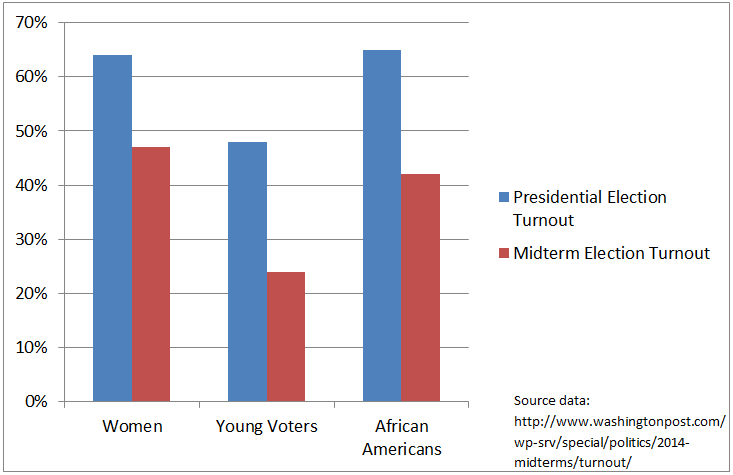The Midterm Elections Will Drastically Affect Humanists
Democratic consultants across the country appeared to have given up on the possibility of turning out their base in this year’s elections, which is why they moved to the center, stayed away from President Obama, and forgot what got many of them elected in the first place.
Here was their calculation: Democrats have three core constituencies—younger voters, African Americans, and women. The problem is the turnout gap during presidential and midterm election years is widest amongst these groups.

According to Brian Hughes, who writes for the WashingtonExaminer.com, “The midterms are often unkind to a sitting president—as Obama learned when Republicans reclaimed the House in 2010—but the president’s level of campaigning in 2010 looks ambitious compared with his efforts this time.”
Between the models that continue to predict low turnout for Democratic strongholds, and the fact that an unpopular president campaigned in 2010 with seemingly no influence in increasing turnout, consultants took a chance this year by essentially writing off the Democratic base and making a play for the center.
Did it work? Obviously not. Democratic messages to independents failed to penetrate the shrinking bubble of information that the average voter is able to retain about politics. At the same time, the typical Democratic base that would normally turn out during midterms didn’t even show up. Overall, turnout was the lowest this country has seen since 1942, when we had a few things going on at the time like our involvement in WWII.
So what’s next? Despite the gracious attempts by Mitch McConnell (R-KY) and John Boehner (R-OH) to show signs that they would be willing to compromise over the next two years to get some things done, a new poll shows that their base doesn’t want them to do that.
A survey by Pew Research shows that 66 percent of Republicans think that the party should stand up to Obama even if less gets done. In contrast, 52 percent of Democrats say that President Obama should work with Republicans even if it means compromising on some issues important to the party.
What does all of this mean for humanists? Indirectly, it means there are less progressively minded representatives in Congress resulting in fewer potential allies to support and promote secular and humanist values.
But some have gone further to say that this election was a bad night for atheist political candidates, pointing to the defeat of open atheist candidate for Congress in Arizona, James Woods. Unfortunately, having an atheist on the ballot doesn’t bring scores of voters out of nowhere to vote for the first time, and it will not convince staunch Republicans to vote for a progressive Democrat in a very conservative district.
Not one candidate identified by the Freethought Equality Fund, a nontheist political action committee, lost because they were an atheist and none of their opponents used religion as a wedge issue against them. They lost because they were Democrats running in a year that was unfavorable to that political party.
But having atheists on the ballot will accomplish something. It will bring us one step further in our effort to show that you can run for office in this country without talking about religion. It will show that if you do run for office as an atheist, you will have the full support and backing of the secular movement and its growing coalitions behind you. And the election of an atheist candidate to Congress will bring us one step further in showing that you can be good without a god.
